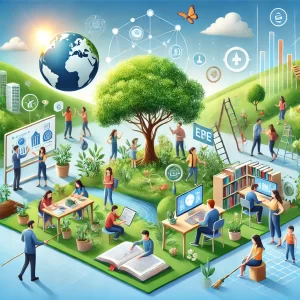The Importance of Education, Learning Skills, and Helping Skills
1. Education: The Foundation of Success
Education is essential for personal and societal development. It provides individuals with knowledge, critical thinking abilities, and the skills necessary to achieve their goals. A strong educational background leads to better job opportunities, economic growth, and social stability. Education also promotes awareness, ethical values, and the ability to make informed decisions in life.
2. Learning Skills: The Key to Continuous Growth
Learning skills enable individuals to acquire new knowledge efficiently and adapt to changing environments. These skills include problem-solving, critical thinking, creativity, communication, and adaptability. In a fast-changing world, the ability to learn and relearn is crucial for career growth and personal development. Strong learning skills also enhance confidence and the ability to tackle new challenges.
3. Helping Skills: Building a Supportive Society
Helping skills, such as empathy, kindness, and teamwork, are vital for creating a compassionate and cooperative community. Whether in professional settings or daily life, the ability to assist others fosters strong relationships and social well-being. Acts of kindness and support strengthen communities, improve mental health, and promote a culture of care and understanding.
Conclusion
Education, learning skills, and helping skills are fundamental to personal success and social harmony. By focusing on continuous education, improving learning abilities, and developing a helping attitude, individuals can contribute positively to their own growth and the well-being of society as a whole.
The Importance of Education, Learning, and Helping Nature
1. Education: The Key to a Better Future
Education is the foundation of personal and societal growth. It provides individuals with knowledge, skills, and critical thinking abilities that help them succeed in life. A well-educated society leads to innovation, economic development, and social harmony. Education also empowers people to make informed decisions, contribute to their communities, and break free from poverty.
2. Learning: A Lifelong Process
Learning does not stop in the classroom—it is a continuous journey. Whether through formal education, self-study, or experiences, learning helps individuals adapt to change, solve problems, and grow personally and professionally. The ability to learn ensures that people remain relevant in an ever-evolving world and fosters creativity and resilience.
3. Helping Nature: Protecting Our Planet for Future Generations
The environment is essential for human survival, providing air, water, and food. Protecting nature is not just a responsibility; it is a necessity. Deforestation, pollution, and climate change threaten ecosystems and biodiversity. By conserving resources, planting trees, reducing waste, and promoting sustainable practices, we ensure a healthier planet for future generations.
Conclusion
Education, learning, and environmental care are interconnected pillars of a thriving society. By investing in education, embracing lifelong learning, and prioritizing nature conservation, we create a brighter, more sustainable future for all.
